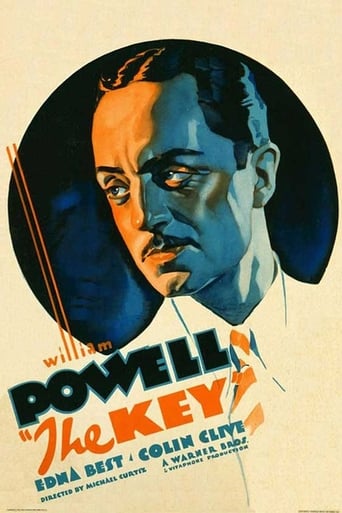davidjanuzbrown
I am a William Powell Fan, and this is one of weakest movies of his career. The biggest problem is the casting. Powell as British Captain Bill Tennent? Does not work whatsoever. Maybe Ronald Colman might have pulled it off, but not Powell, who does not even attempt a British Accent. Even worse was Colin Clive was Captain Andy Kerr and Edna Best as his wife Norah Kerr, He is a boring pathetic character and she is ugly to say the least. To be honest the story that takes place in Ireland in 1920 was good, but the casting was wrong. I would love to see this remade with better British Actors then Clive and Best and an authentic Englishman. Maybe Charlie Murphy as Norah might work. 3 stars for the story and setting.
MartinHafer
William Powell is inexplicably cast as Captain Bill Tennant. I say inexplicably because he is supposed to be a British officer, but sounds just like an American--which he is. They could have gotten around this by saying he was a Canadian but didn't. So, at the outset, the film has a big deficit in regard to casting.Tennant is a bit of a rogue. Although he's a good soldier and always seems to land on his feet, he has a long history of sleeping with the wrong women--often married women. Because of this history, it's very surprising that he is friends with Captain Andy Kerr (Colin Clive)--who is a rather dull married man. Kerr also is clueless as to how big a scoundrel Tennant is, as in the past, Tennant had a relationship with Norah--who is now Andy's wife. Not surprisingly, Norah and Tennant soon pick up where they left off.When Andy learns the truth, he does something crazy--he just wanders into the streets of Dublin--a terrible place to walk about if you are a British soldier during the Troubles in Ireland (i.e., during the height of the violence in Ireland in the early 20th century). Not surprisingly, he's taken prisoner by Irish nationalists and will be executed if a member of Sinn Féin is hung. What is Tennant to do? After all, Andy's predicament is his fault.I think with better casting as well as a less sappy love story this film would have played a lot better. I did like how the film took a rather neutral view of the Irish problems and the look of Ireland in the film was quite nice.
blanche-2
William Powell is Bill, a British officer who finds an old love in Ireland in "The Key," a 1934 film also starring Edna Best (Norah) and Colin Clive (Andy). A very young Donald Crisp, though his voice identifies him immediately, plays a Sein Fein leader whom the British army seeks to capture. When Bill arrives on the scene, he finds himself living below Andy, a fellow officer and friend, but he doesn't know that the woman he once loved is married to him - and Andy never knew that Bill and Norah were involved. Realizing that their breakup was a mistake, Bill seeks to rekindle the relationship. Norah has continued to love him, and it's stood between her and her husband throughout their marriage.Full of dry ice and night scenes, this old movie was hard to see at times. The story is very familiar, the film is short; it doesn't have a lot to recommend it. It's atmospheric, although this viewer was not drawn into the story. Powell brings it lots of energy - he's the best thing in it; Best and Clive don't project much and look unhappy throughout.
brianina
"The Key" starts off promisingly with atmospheric photography as British troops track down a Sein Fein leader. Apparently Warner Bros thought this wasn't enough, so halfway through the film a love triangle is introduced between William Powell, Edna Best and Colin Clive. All it succeeds in doing is derailing the film into very familiar territory. Seeing Colin Clive making dead bodies with a gun rather than bringing them back to life in a lab sparks some interest but other than that he spends his time looking glum (did he ever smile?). William Powell begins the film with an accent and a "right-ho, pip, pip" clipped speech that vanishes by the third reel and he and Edna Best (in her first U.S. film) have absolutely no chemistry. Director Curtiz does well until the highpoint of the love story where he pulls the camera out the window into the fog and goes into a flashback that looks like it belongs on a 1890 stage. Add to this a criminally underused Donald Crisp and a hokey ending and you have one missed opportunity.


